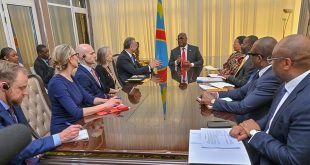
By Maria Burnett
I kindly beg you to ensure that you keep our children. I don’t think I will be coming back.’
Those were the last words of Saidi Lutaaya, spoken over the phone to his wife. He had been picked up from Old Taxi Park in Kampala in November 2007 by men wearing civilian clothes driving an unmarked car. His family has not heard from him since. But sadly, they learned about his final hours from those who saw him die.
Members of the Joint Anti-terrorism Task Force (JATT) arrested Lutaaya even as President Yoweri Museveni welcomed Queen Elizabeth II to Uganda at the start of the Commonwealth Heads of Government Meeting (CHOGM). JATT personnel brought Lataaya to their headquarters in the lush Kampala suburb of Kololo. They beat him while interrogating him about his alleged knowledge of rebels of the Allied Democratic Forces (ADF).
He was severely injured, and soldiers took him to Mulago Hospital, where he died a few minutes later. Nurses there said that he had a hole in his foot and that the bone of his lower leg was poking out, that he had been hit in the head with a hammer, and that blood was oozing out. But his family was never formally informed of his death. Soldiers collected his body and took it away.

After that last desperate phone call, the man’s family began a frantic search. They visited police jails. They paid money to government officials who claimed to be able to secure his release, but to no avail. After several days, some informants who moonlight for JATT told the family not to pay anyone because the man was already dead. Only recently did the family secure a death certificate for Lutaaya. It says he arrived in a comatose state, but that no cause of death had been ascertained.
Two weeks ago, Human Rights Watch published an in-depth report based on more than 80 interviews that documents routine human rights abuses, such as illegal detention and torture, committed by JATT personnel between 2006 through the end of 2008. The pages of The Independent have frequently exposed the horrors of torture in Uganda at the hands of security personnel, especially JATT and military intelligence. Human rights groups have routinely denounced the lack of access to detainees held in Kololo. Some have documented the physical scars when the victims were fortunate enough to be released.
The overwhelming evidence of illegal detention and torture by JATT in Kololo has been met with official denials, excuses and contradictions. Most important, there have been no investigations or prosecutions. Look no further than comments by military spokesmen in the press over the last few years to see the contradictions.
First, categorical denials that there are ‘œsafe houses,’ in Uganda. Then later, yes, Haroon Saley and Mufti Bhayat were detained without charge for 11 days in the ungazetted JATT offices in Kololo in August 2008, but they were ‘œterrorism suspects’! Initially, the Chieftancy of Military Intelligence (CMI) denied that the JATT offices at the top of Kololo Hill are a site of illegal detention. But, later, the UPDF spokesman admitted that Hanifa Nalukwago was held illegally in the JATT offices in Kololo for over two months in early 2008. And, yes, Abdu Semugenyi died in illegal JATT custody in 2006, but while ‘œtrying to escape’.
In meetings with Human Rights Watch, the chief of military intelligence, Brig. James Mugira, acknowledged his responsibility for command and control over JATT operations. He told Human Rights Watch that he had planned ‘” since taking over from Col. Leopold Kyanda in August 2008 ‘” to ‘œpolish the place up.’
These promises are important. Hierarchy and meaningful control in the military and security services can ensure that civilians do not suffer at the hands of those given the power of the state. But for Brig. Mugira’s ‘œpolish up’ to be meaningful, it needs to be open and clear in its intentions. Transferring culpable personnel, covering up abuses, and dismissing allegations without investigations will not get the job done.
President Museveni wields tremendous power to influence how these allegations of illegal detention, torture, enforced disappearances and deaths in JATT custody are addressed. Brig. Mugira will need his full support. Human rights monitors should be granted access to any detention facility, including JATT’s offices in Kololo.
Those found responsible for abuses should be appropriately disciplined, including termination from active service, or prosecuted. Most important, as the one at the top of the chain of command, President Museveni should ensure that no one prevents or obstructs such investigations.
Parliament also has a critical role to play in curtailing abuses by JATT. Certain committees such as Defence and Internal Affairs and Presidential Affairs have a legal mandate to examine and comment on policy matters of the military, police and intelligence organisations. Committee members should urgently engage in this work and see that there is adequate civilian oversight for all security organisations.
Torture committed by state security organisations is not a partisan issue. The ruling party and the opposition parties should work together to criminalise it in law and eliminate it in practice.
Uganda’s national elections are not so far away. All previous national elections since President Museveni took power have been tainted by allegations of fraud and state-sponsored violence. Uganda has still not had a peaceful transfer of power since independence. The credibility of any electoral process starts well before polling day so the practice of state security agents operating in violation of Ugandan and international law needs to end now. This is the time to rein in groups such as JATT and to disband them if they act outside the law.
President Museveni has a constitutional duty to safeguard the laws of Uganda and to promote the welfare and rights of all its citizens, even those who might be criminals, even those he might disagree with, even those who might pose a threat to him in the 2011 elections. The courts are the only lawful place to determine an individual’s guilt or innocence, based on due process and respect for individual rights.
Uganda’s international standing is tarnished by the continued tolerance of these kinds of abuses, especially now that it serves in such a high visibility position on the United Nations Security Council.
The author is a Researcher – Africa Division, Human Rights Watch
 The Independent Uganda: You get the Truth we Pay the Price
The Independent Uganda: You get the Truth we Pay the Price



